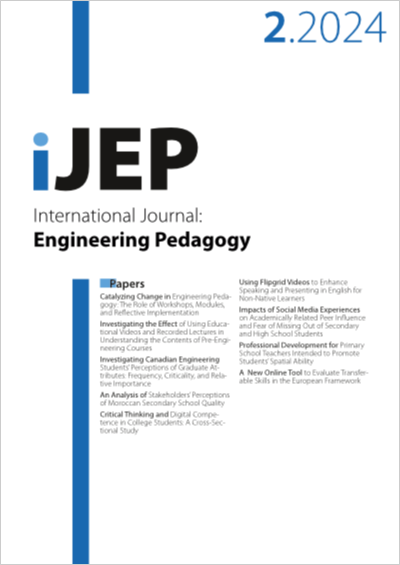Investigating Canadian Engineering Students’ Perceptions of Graduate Attributes: Frequency, Criticality, and Relative Importance
DOI:
https://doi.org/10.3991/ijep.v14i2.42341Keywords:
student percpetion, Canada, quantitative survey, undergraduate students, engineering competenciesAbstract
This study investigates the perceptions of Canadian engineering students regarding the frequency and criticality of the 12 graduate attributes (knowledge, skills, values, and behaviors that engineering students are expected to demonstrate upon graduation) outlined by the Canadian Engineering Accreditation Board (CEAB). This study aims to assist engineering educators in gaining a better understanding of students’ expectations regarding how engineering competencies will be demonstrated in practice. This information can guide the improvement of engineering curricula and help engineering programs meet accreditation requirements for continuous enhancement. Descriptive and test statistics were used to analyze a quantitative survey administered to 340 undergraduate engineering students at a large Canadian university. Findings suggest that the students perceived the frequency and criticality of most graduate attributes differently. Individual and teamwork, communication, professionalism, lifelong learning and engineering tools, were viewed as more frequent than critical, while ethics and equity, impact of engineering, investigation, and design were perceived as more critical than frequent. The study also found that communication, individual and teamwork, and problem analysis were perceived as the graduate attributes with the highest relative importance (frequency multiplied by criticality), which is consistent with the literature.
Downloads
Published
How to Cite
Issue
Section
License
Copyright (c) 2024 Renato B. Rodrigues, Jillian Seniuk Cicek, Marnie Jamieson, Sylvie Doré

This work is licensed under a Creative Commons Attribution 4.0 International License.



